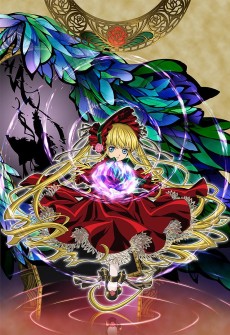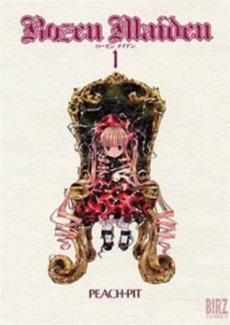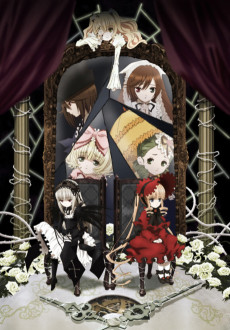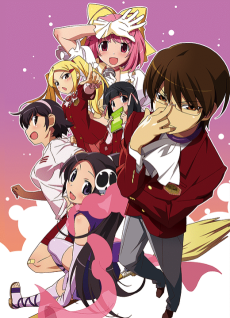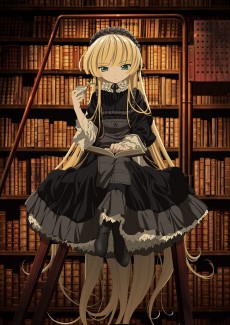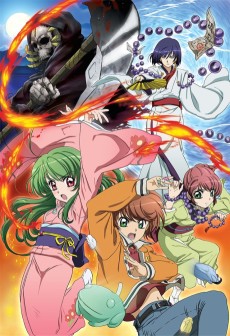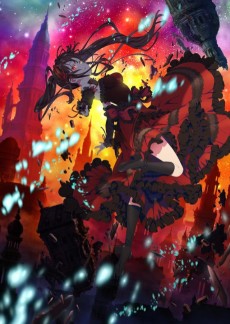ROZEN MAIDEN
STATUS
COMPLETE
EPISODES
12
RELEASE
December 24, 2004
LENGTH
24 min
DESCRIPTION
Sakurada Jun spends his days online, ordering whatever he takes a liking to, only to return it before the payment is due. Due to psychological trauma from school, Jun generally keeps contact with people as little as possible. One day he finds instructions online that tell him to put his order into his desk drawer. Rubbing it off as a joke, Jun mindlessly does so only to find that his order instantly disappears from his drawer. A package suddenly appears, containing a beautiful antique doll. When wound up, this doll comes to life. Sadly for Jun, this doll Shinku views Jun as an equivalent for a servant. Despite the constant demands Jun now receives from Shinku, she slowly helps him overcome his fears of human contact as well as protect him from the deadly battles that come into his life due to her appearance.
CAST

Suigintou

Rie Tanaka
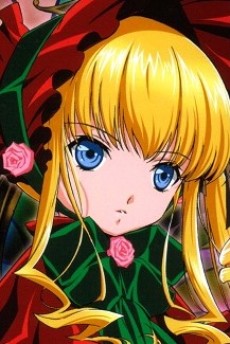
Shinku

Miyuki Sawashiro
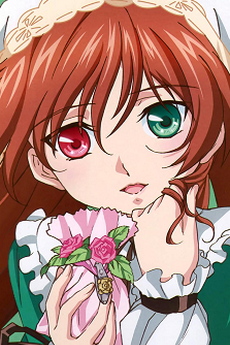
Suiseiseki

Natsuko Kuwatani

Souseiseki

Rika Morinaga
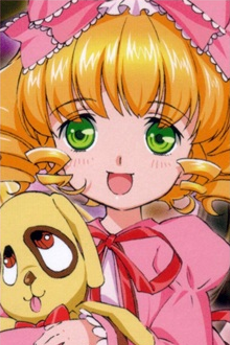
Hina Ichigo

Sakura Nogawa
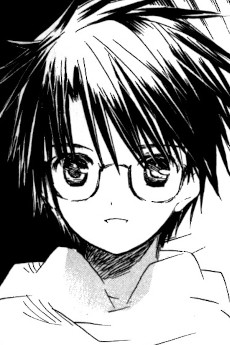
Jun Sakurada

Asami Sanada

Nori Sakurada

Noriko Rikimaru

Detective Kun-Kun

Kyousei Tsukui
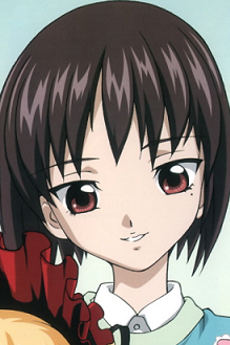
Tomoe Kashiwaba

Masayo Kurata
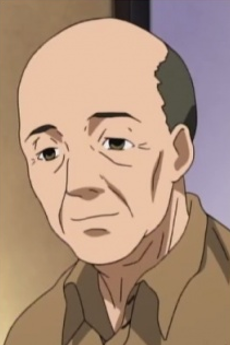
Motoharu Shibasaki

Ikuo Nishikawa
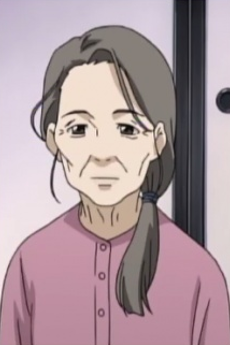
Matsu Shibasaki

Yoshino Ohtori
EPISODES
Dubbed
RELATED TO ROZEN MAIDEN
REVIEWS

TheRealKyuubey
60/100Fans of ball-joint dolls are going to love it to death.Continue on AniListJun Sakurada is a teenage boy who has left school and refuses to leave the house. He’s doted on hand and foot by his older sister, Nori, who he lives with. You know, because this is an anime, and teenage protagonists living with their parents would just be heresy. He occupies his time by ordering a bunch of junk online, using it briefly, and then returning it just in time to exploit Japan’s ‘cooling off period” law. One day, he receives an offer that asks him one simple question: “Will you wind it, or won’t you?” He clicks yes out of bored curiosity, and not long after, a suitcase appears on his floor, containing a beautiful blonde ball-joint doll in a red southern belle dress.
He winds this doll, as per his promise, and is shocked when it actually wakes up and starts talking to him! It… I mean, she… Introduces herself as Shinku, the fifth in a series of magical Rozen Maiden dolls, and he’s been selected to be her servant! With this haughty totty ordering him around, and a bunch of other dolls arriving at his house via airmail(I mean that literally, they crash through his window), will this hikikomori’s0 life ever be the same? Or will it forever be changed by his involvement with these dueling dolls and their mysterious “Alice Game?”
When I first watched Rozen Maiden, I wasn’t very impressed by the animation quality, but I was willing to give it a pass… After all, as dated as it looked, it was probably one of the better looking shows of the late nineties, right? But then I saw online that it came out in 2004, and I sat there in a stunned silence until I came across the name Studio Nomad, and I understood a little better. See, Nomad is a studio comprised of former Madhouse and Pierrot staff, and neither of those companies have ever really been anywhere near the forefront of production quality, especially back in the early aughts. I reviewed a Pierrot title a while back(Twelve Kingdoms), and while I gave it an 8/10 in general, the animation was one of the few factors that kept it from getting the higher score that I wanted to give it.
And Rozen Maiden just happens to have been the first outing for Studio Nomad, which just makes matters even less promising. The animation isn’t what I’d call ugly… Trust me, we’re nowhere near a Deen or Xebec level of bad… But it doesn’t take a trained eye to see how low their budget must have been. Character movements are jerky and clunky, and they can look off-model in several shots. The visual direction is pretty good, as the people in charge of this were clearly trying to make their product look better than it was destined to look, but there was only so much they could do with it. The only time the animation really starts to impress is during the fight scenes… Yes, these ball-joint dolls fight each other, and it’s as awesome as it sounds… So I’ll give them credit for that. The action, when it’s happening, is kinetic and a lot of fun to watch.
The artwork, however, is really weird in it’s presentation. For the parts of the story that take place in the dream world, the visuals are striking, highly imaginative and full of very beautiful, very tonally appropriate imagery, and I loved watching the characters interacting with these lovingly crafted environments. In the real world, however, it’s nowhere near as interesting. There’s a lot of detail, to be sure, but it still feels kind of lifeless and flat, and the characters just feel tacked on, like stickers on a television screen. The character designs are pretty neat, though, especially with the dolls, who’s colors schemes and outfits say a lot about their personalities and dispositions.
As for the English dub… Woof. This is easily one of the more annoying ones I’ve had the chance to hear. That might just be me, though… The main two actors are Mela Lee and Mona Marshall, who were both highly prevalent at the time of this dub’s release, and I’m not a fan of either of them. I don’t think I’ll draw much ire for putting down Mela Lee, who’s voice just sounds like the audio equivalent of Splenda in most of her roles, but I might just be angering a substantial fandom when I place Marshall in the same ballpark. So let me explain.
I respect Mona’s body of work… I mean, how can you not respect somebody who’s played more cartoon characters than Daws Butler and Mel Blanc combined? And she has a very impressive amount of range and talent, but when she’s playing young boys, she’s about as convincing as Zac Efron in The Lorax. I didn’t mind it as much in Wolf’s Rain, as he was kind of a quiet character, but as Jun, her voice is just all over the place. It’s the one kind of role I never really like her in, and to say she’s worse than Mela Lee in this dub just sounds excessively cruel… But it’s true. The rest of the cast isn’t any better, as they seem to range from soft and screechy to soft and waify. At least Sherry Lynn sounds like she’s having fun as Hina Ichigo, but Mela Lee’s performance in the role of Shinku just sounds like she’s reading her lines off of a cue card. Which is a shame, because she nailed the character’s upper crust accent.
The only real saving grace of the dub is Karen Strassman in the role of Suiginto, the villain of the series. While the original seiyuu did sound creepy and sinister, Strassman actually kind of outperforms her, adding layers of bitter pain and jealousy to the mix. Which is great, because as we find out, that’s exactly the kind of jilted antagonist she is. Unfortunately, one solid performance is not enough to base a recommendation on, so I’m going to have to call ‘sub over dub’ on this one. The music, while serviceable, is still pretty generic and repetitive, with standard plinky slice-of-life tunes dominating most of the soundtrack, and an instrumental version of the opening being thrown in for a lot of the action scenes.
When talking about the story and writing of Rozen Maiden, there are three different sides to it that need to be examined. The first one is the main plot, revolving around Suiginto and The Alice Game. It can be a little confusing if you’re not paying attention, but the goal of the game is apparently to be the first doll who meets Father, the man who created them. This plot is the reason all of the action in the series exists, and with Suiginto at it’s core, it also gives the series a pretty solid, intimidating antagonist. It creates some very high stakes, not only for the few dolls you actually care about, but for their human masters as well… And even for Suiginto. The problem is that when you get right down to it, the villain is the only character who actually wants something to happen. I’m not a fan of main characters who’s only goal is to preserve the status quo and live a peaceful life, and the entire cast doesn’t want anything other than to exist. It makes it kind of hard to root for them, because when nothing’s happening…
The second side of the story is my least favorite of the three, and it’s exactly the kind of story most of the characters would like to have. It’s the slice-of-life side. About half of the series’ screen time is centered around Jun, Nori, and the dolls just hanging around the house and interacting with each other. I’d be lying if I said nothing funny happened here… An early gag with Shinku and the toilet had me in stitches… But for the most part, this show just isn’t very funny. The jokes are either repetitive or just way too drawn-out, and some of the material is just plain painful. And then you have shorelines like the Snow White rehearsal, which was about as pointless as leveling Aeris in FF7, unless you’re actually invested in the romance between Jun and Shinku.
Speaking of which, the comedy isn’t the only thing wrong with the slice-of-life side of the story. The other giant problem I had with this show… Which I didn’t fully understand until my second viewing over the course of this week… Is that it is, in essence, an elaborate pedophile fantasy. Yeah, I know I’m going into lunatic Nancy Grace territory here, but hear me out… Take away the fact that Shinku and her friends are animated dolls, and Rozen Maiden becomes the kind of series that could most easily be described as a harem where all the options are little girls. They seem to match the loli stereotypes, too… You have the precocious one, the tsundere one, the shy waify one, and the hyper Genki one. It’s like a weird combination of Love Hina and Strawberry Marshmallow.
And before you start telling me that I’m looking too far into it, and it’s not real loli because the characters in question aren’t biological humans, I’d like to point out two things. First of all, the lolis in UFO Ultramaiden Valkyrie weren’t human, but the show was still really damn creepy. “They’re not human” is just a half-assed excuse. And second of all, these characters don’t really feel like dolls… They move independently of their ball joints, to the point that I have to wonder why they have them in the first place, and they’re biological enough to get hungry, eat, and taste what they’re eating. Taking those facts into account, along with the unsettling level of sexual tension between Jun and Shinku, and it’s really hard to hold onto the illusion that these characters really are just walking ball-joint dolls. The ‘guy takes care of a bunch of little girls’ setting is there so the viewer can imagine himself in Jun’s shoes, and your imagination is exactly where all the debauchery that would never be presented on screen is intended to happen, and with unnecessary suggestive moments like the laundry episode lingering about, they’re pretty freaking transparent about it.
The final side of the story is my favorite one, and it’s the development of Jun Sakurada as a character. Rozen Maiden was one of the first stories to try and tackle a Hikikomori character, alongside Chobits and Welcome to the NHK, and it takes a much different approach from those other two. (This part’s a bit spoiler-y.) Rather than being a failed college student or a paranoid drug addict, Jun is much more relatable in his circumstances. He was a very impressive student, standing tall as one of the best in his grade, but the attention this got him… Remember, kids, Japanese schools post your grades on the wall for everyone to see… Wound up leaving a lot of pressure on his shoulders, with both teachers and students talking him up as a prodigy despite the fact that they only knew him through the pedestal that they were all placing him on. So when he finally started to cave under the pressure and get bad grades, the backlash was unbearable. In addition, he was starting to get teased over his sewing prowess, and it all just crushed him, causing him to have a mental break down and hole himself up in his room.
It’s some fairly compelling stuff, and the way he’s portrayed whenever he faces the idea of going back there is very strong. It unfortunately culminates in a scene with his sister where she says some things that… Let’s see, how spoilery do I want to get, here… Well, she gives him a tearful, emotional pep talk that not only misses the entire point of his character, but it honestly sounds like she’s trying to make him feel even more guilty than he already feels. She tells him “No, you’re not a horrible person for inconveniencing us, we feel like horrible people for not being able to fix you!” Great, so you’re trying to make him feel better by telling him ANOTHER negative impact he had on your lives? Geez, with a sister like you, who needs social anxiety? Oh, and at one point, she totally also has a sex dream about him. Make of that what you will.
I have a theory about this show, and it’s based solely on season 1… Which is all I’ve seen so far. My theory is that the dolls aren’t actually real. He ordered them online, in the order and pace that they arrived, and is only imagining the interactions and stories he’s having with them. And his sister… His dear sister, who loves him and would do anything for him… Is playing along, having tea parties and elaborate fantasy play sessions with his little brother and his dolls, all while she wonders(whenever she’s alone with Shinku) whether or not she’s doing the right thing by enabling him. That would explain why she never has as animated a reaction to the dolls as he does. It’s kind of a spitball theory, and there’s no real evidence for it, but try watching the show while thinking about it… It actually kind of makes the series better.
Rozen Maiden was originally available from Geneon, which of course means the original balls-expensive DVDs are out of print. It’s currently available from Sentai Filmworks, and at this point, there are several different DVD sets you can buy… I don’t think it’s available on Blu-ray outside of Japan, though. Personally, I’d recommend the 2011 Sentai box set, which includes this season, plus the second season and a 2 episode OVA. It’s only five disks and it’s relatively cheap, but it comes with the disks stacked on top of each other on a single spindle. It’s possible to accidentally crack the disks while pulling them out, so moving them to a safer case is probably a good idea. In addition to the second season and OVAs, there was also a new season in 2013, that was actually dubbed by Sentai, so I’m expecting a better dub in that set… Or at least I was, until I saw that Nancy Novotny was playing Nori. Because… Ew. My least favorite character, played my least favorite actor. THAT’s gonna be a fun review. In any case, all four iterations of the franchise are available for streaming on Crunchyroll.
While I can’t say I’d really recommend this series… I haven’t watched the other seasons yet, so my opinion might change… It wasn’t really a bad anime, either. It’s kind of a mixed bag. It has more than it’s fair share of problems, especially in terms of it’s production values and obvious loli-harem leanings, but there’s also a lot of things to love about it. While the art itself is hit or miss, the art design is really strong, and the visuals and imagery can be downright beautiful. It’s a very cute show, very well paced, and while it’s not for me, the effectiveness of the humor will vary from viewer to viewer. Fans of Ball-Joint dolls are going to love it to death, and understandably so, as I don’t think there are any other shows that feature that interest as prominently. I didn’t really enjoy it, but I can see why a lot of people would, which is why I’m going to give Rozen Maiden a 6/10.

ZNote
70/100Nothing heals a hikkikomori's abandoning quite like a battle royale with dolls.Continue on AniList(Video includes audio. Be sure to unmute) Rozen Maiden is a series filled with toys, whether those toys be the Rozen Maidens themselves as the little bisque dolls—no, Kitagawa Marin is not in this series—that are involved in the Alice Game, or the toys that litter Sakurada Jun’s bedroom. Jun’s perspective on life effectively mirrors how he treats the various boxes, toys, or “goods” strewn about – something that is not worthy of holding onto, and casting away anything that could tie him to those things. His bedroom is thus a place of hikkikomori withdrawal from the world. He is, in essence, toying with the rules of the cozy little reality he has crafted for himself, where he is master of all, especially in regards to his mastery of returning things by the cutoff date for the money back guarantee. His behavior is just as thrifty as it is infuriating, in no small part thanks to the rather thankless way he treats his caring sister Nori.
Jun’s closed-off heart gets violently shaken from its safe bounds by the arrival of Shinku, a doll imbued with life and magic. A most-unwelcome addition to Jun’s household, she is not merely the harbinger of the Alice Game and its deadlier consequences; she is the bringer of a kind of counter-brusqueness to Jun’s own brusqueness. Impatient and commanding, she has her own fair share of worries, for which she must be mindful. Especially considering that the players in the Alice Game are already trying to hunt her down, she must make a pact with Jun to become his master, and he her servant so that she can make the most of her powers.
Shinku’s presence, as well as the other caravan of dolls that enter the fray (if not through Jun’s window by crashing into it violently), both bring the action to the story and provide enough digression to allow things to settle down for a brief moment and breathe. The Rozen Maidens are a blend of aristocratic panache and childlike—if not outright childish—intrigue and enthusiasm. While they may be there primarily to fight, not every moment in the series can be chock full of action, and the action moments that do exist within it are working with some animation limitations. Therefore, Rozen Maiden allows more slice-of-life mini-plots and the occasional running gag to dial things back. As the cast expands ever larger and all occupy Jun’s room for themselves, it’s inevitable that such personalities would butt heads over things.

(While the slice-of-life moments may not progress the Alice Game plot, each dialogue gradually gives Jun the chance to become at least a little more sociable, even if his manners take a little longer to polish themselves up. An entire episode of petty arguing and over-the-top roughhousing makes for one of the show’s best time-outs) But it’s only a matter of time before the battles reassert themselves as the intrusive element. Though rare skirmishes take place in the Sakurada house itself, most take place beyond the natural world and into the more supernatural settings. The so-called N-Field, where most of the battles for the Alice Game take place, manifests as a warped and rather delightfully perverse dreamscape of the characters. Reflecting either the contents of their hearts, or realms where dreams and hearts intertwine, each Rozen Maiden essentially risks their entire sentience and powers on whether they win or not. These areas convey the tone of putting everything on the line, baring souls before one another and seeing whose resolve is stronger both in magic and mind.


(The trips into the dreamland and surrealist N-Field allow for some occasionally solid backdrops and incorporations of the environment for action. It’s not the most harmonious marriage and does shortcut some choroegraphy, but it also demonstrates some creative fun with the space and concept) But whether it be through the series’s brand of slice-of-life or the action-based Alice Game, interwoven through it all is Jun’s own apprehensions, or more specifically, the apprehensions of the cast as a whole. Underlying many of the motivations is that of abandonment. As a concept, abandonment comes in many forms – it is not restricted merely to people outright leaving you of their own volition, but just as much the people or things that you yourself cast aside. The feeling that it can leave behind is, depending on the circumstance, anything but pleasant. It can perhaps be such to the point where you would rather look away from the feeling altogether, if not outright insist to the contrary that everything is fine. The dolls, who themselves are the main vehicle to help teach this lesson, are themselves not immune to the folly, either. It levels the playing field for Rozen Maidens’s thematic throughline, allowing both human and doll, action and non-action, to push it along.
As the material makes clear however, nearly everyone houses something within their hearts that they would rather look away from or not confront. With each new battle in the Alice Game, a little more perspective on all these matters unveils itself. One cannot run from their problems forever, otherwise they themselves could find their entire happiness or outlook akin to an abandoned or broken doll; any beauty that there might have been within is faded and unrecognizable. Hence why Nori so laments what Jun has become, and despite her mindfulness of needing to give him space, she acquiesces with an enabling hospitality that Jun frankly doesn’t deserve in the hope that he may, finally, return to the happier self he once was. It might be tempting to blame Nori for making things worse, but she never could have expected to effectively function as a surrogate mother.


(The idea of discarding things, or the fear of being discarded altogether, colors the cast’s characterizations. Much of the drama is fueled by the antagonism between these characterizations and the natural friction that results from the colliding of the real with the supernatural) The key though (not the kind that you plug into the Rozen Maidens’ backs) is that all the building blocks for that shift back to the happier Jun are placed early. As withdrawn as Jun was from the world around him, his purchasing of “goods” and getting as much value out of them as possible before returning them does demonstrate an innately curious outlook for the strange and bizarre. Granted, it’s for a vice that’s feeding an unhealthy habit, but the primordial sensibility still exists. Between that and swinging an old lacrosse stick Nori brings him to try and coax him out of the room, his arc reaches its catalyst in a note that offers a simple choice, posed by the question: “Wind up? Don’t wind up?” Though he may have done so with his eyes metaphorically rolled in the back of his head and disbelief that anything like what was promised could happen, his barren heart begins to turn. And all the while, the dolls themselves undergo their own changes, even if in herky-jerky motions that are not as ball-and-joint smooth as they could be.

(Rozen Maiden’s attempts to try and tie the concepts of dreaming, abandonment, and the closing of hearts is not handled in the cleanest, most-pristine manner, even taking into account that this is only a first season of a multi-season property. However, the sentiment is sufficient for what the narrative is trying to accomplish) Underneath that not-as-clean exterior does lie a series that has its heart in the right place, and despite the occasional shortcomings of both the narrative and the presentation, Rozen Maiden still manages to produce fun senses of both comedy and drama. A colorful little toybox of a series, it plays with its cast in amusing ways by cobbling together some disparate or disproportionate parts into a new whole by having fun with its own brand of plastic. Not every series has the longest shelf life or the most thorough reach, but I was happy that I saw it.
Now, if you’ll excuse me, Detective Kun-Kun is on!
SIMILAR ANIMES YOU MAY LIKE
 ANIME ActionFantasista Doll
ANIME ActionFantasista Doll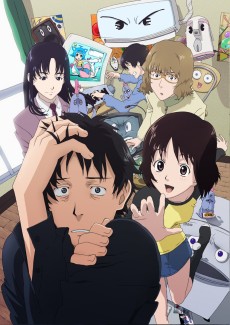 ANIME ComedyNHK ni Youkoso!
ANIME ComedyNHK ni Youkoso!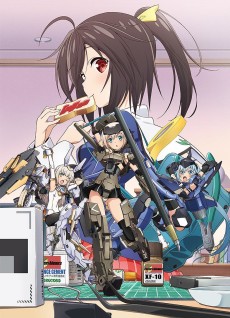 ANIME ActionFrame Arms Girl
ANIME ActionFrame Arms Girl ANIME ActionKaibutsu Oujo
ANIME ActionKaibutsu Oujo ANIME MysteryKamisama no Memochou
ANIME MysteryKamisama no Memochou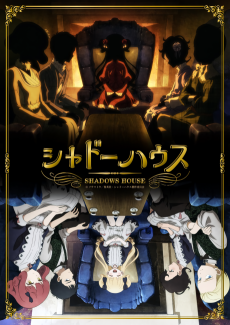 ANIME FantasyShadows House
ANIME FantasyShadows House
SCORE
- (3.5/5)
MORE INFO
Ended inDecember 24, 2004
Main Studio Nomad
Favorited by 474 Users


